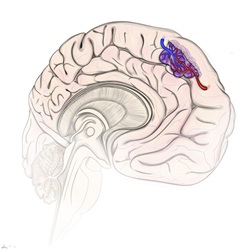What are Cavernous Malformations?
Cavernous malformations, or cavernomas, are abnormal clusters of blood vessels that can be found anywhere in the body but usually only poses a serious problem in the brain and spinal cord.

In some patients, cavernous malformations may exist without any symptoms. However, in other people, these masses may bleed causing neurological issues, such as seizures and stroke-like deficits, which in some cases can be life-threatening.
Cavernous malformations may be treated surgically to remove these risks.
The University of Miami Health System is designated a Center of Excellence in Cerebral Cavernous Malformation (CCM) by the Alliance to Cure Cavernous Malformation.
The University of Miami Health System is one of only a few centers in the nation and the only institution in Florida to have earned this distinction. The recognition is awarded to centers based upon their exceptional and multidisciplinary care of CCM patients and their cutting-edge angioma research, coordinated clinical care, and exceptional surgical outcomes.
Robert Starke, M.D., cerebrovascular surgeon and Medical Director of the CCM Center of Excellence notes that the team has won numerous awards for leading edge care of CCM patients.
We have a number of clinical trials enrolling and following CCM patients to better assess outcomes according to specific patient and disease characteristics. Additionally, we are collecting blood and CCMs from the operating room to help develop better molecular tests to determine which CCM may bleed. Research on the collected CCMs is working to develop novel medical therapies, imaging, and minimally invasive treatment options.
In addition, the team has published the largest series reviewing our outcomes using minimally invasive tubular ports for removal of deep seated and eloquent CCMs.
Publications:
- "Use of Tubular Retractors for Minimally Invasive Resection of Deep-Seated Cavernomas" (PubMed, 2020): Read the article.
- "Do brainstem cavernous malformations have a higher rate of hemorrhage?" (PubMed, 2015) Read the article.
- Additional publications authored by Dr. Starke: Read here.
Your CCM Center of Excellence Team
At UHealth, cavernoma patients receive care from a collaborative team of highly experienced doctors including cerebrovascular neurosurgeons, neurologists, radiologists, epileptologists, clinical geneticists, and a team of clinical and basic science researchers who work to discover and translate novel cavernoma therapies into the clinic.
Team Members
Robert Starke (Director)
Neurosurgery, Neuroradiology, Neurosciences
Starke Lab Miller School of Medicine (miami.edu)
Asdaghi, Negar
Stroke Neurology
Bhatia, Rita Ghose
Neuroradiology
Thorson, Willa
Genetics
Detyniecki, Kamil
Epilepsy Neurology
Billy Thompson
Basic Science Research
Ahmed Abdelsalam
Clinical Research
Anabela Cieslicki
Clinical Research
To book an appointment for an evaluation, please call (305) 355-1101.
Why Choose UHealth?
A multidisciplinary team of experts. At UHealth, you have access to the best neurosurgeons in the region. You will be taken care of by a passionate and knowledgeable multidisciplinary team of medical professionals who make sure that you receive the right treatment for your unique condition.
Questions? We're here to help.
Our appointment specialists are ready to help you find what you need. Contact us today.